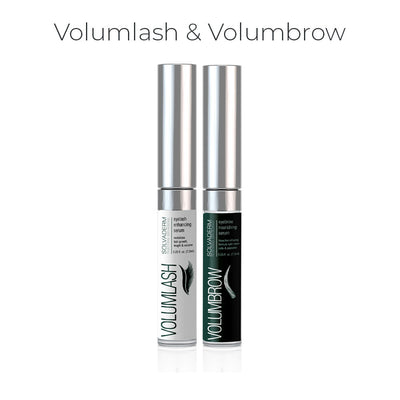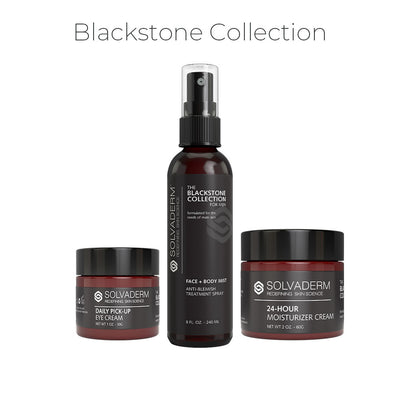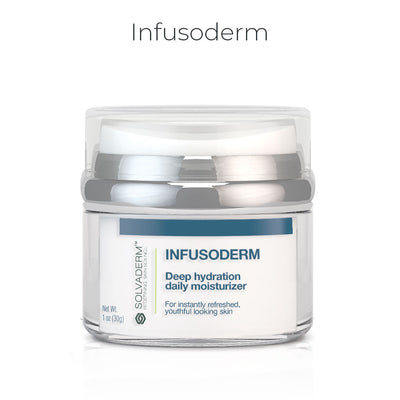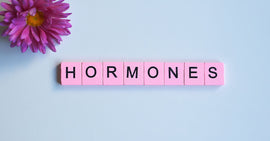Even if your skin type is not oily, there are times when you may notice your complexion becoming greasy and shiny during the day for no reason that you can discern. You may have asked yourself, “Why do I have oily skin all of a sudden?”
There are a number of reasons why the skin can become oily, including lifestyle factors, medical issues, poor skincare, and even heredity. In this article, we’ll explain all of the key causes of sudden oily skin, common symptoms, and some of the most effective techniques for combatting this common problem. Keep reading and you’ll be well on your way to a healthy, clear, oil-free complexion.
Why Does Your Skin Become Oily All of a Sudden?
Oily skin is problematic on a number of levels. The added grease can clog your pores, making you more susceptible to breakouts, and it can also make your pores appear visibly larger. In addition, it gives your skin a shiny appearance that you may not like, and the added oil may make your makeup difficult to apply or cause it to run. Let’s look at some of the most common reasons for sudden oily skin.
Genetics
Unfortunately, oily skin is one of the traits that you may inherit from close family members - primarily your mother and father. Skin type and appearance are features that are written into your DNA, so in particular, if your parents have oily skin, there’s a good chance you will develop it as well. While heredity is not the only cause of oily skin, it’s certainly an important factor to take into consideration.
Dehydration
The skin can become dehydrated by factors such as harsh climate conditions and overexposure to harmful UV rays without adequate protection. In addition, a lack of proper water intake daily can dry out your skin, leading to symptoms of dehydration like a flaky, dull complexion, skin sensitivity, and oily skin. When the skin becomes too dry, the sebaceous glands overproduce oil in order to compensate for the lack of hydration. Ensure that you drink at least 8 full glasses of water per day to help prevent dehydration from occurring.
Stress
If your face is suddenly oily, it could be due to the impact of stress on your life. High levels of anxiety over a period of time lead to the release of the hormone cortisol, and one of the effects is the production of additional sebum from the skin and scalp. This can lead to greasy hair and skin, and make your complexion more prone to breakouts.
To deal with this concern, try to incorporate some methods for reducing the stress in your life, like improving your work-life balance, practicing yoga, exercising on a regular basis, or taking a course in mindfulness and meditation.
Eating Too Much Sugar
When it comes to oily skin, the saying “you are what you eat” certainly applies. Sugar leads to excess production of male androgens like testosterone, which can make the pores larger and lead to excess sebum production. This applies to sweet treats low in nutritional value, as well as fruit that is very high in sugar. If you often ask yourself, “Why is my face greasy all of a sudden?” consider modifying your diet to include healthy, low-sugar foods which will promote a radiant, glowing complexion.
Harsh Products
If you follow a strict skincare routine daily but your complexion is still greasy, you may often ask yourself, “Why is my face suddenly oily?” In fact, overdoing it with your products and using harsh creams, cleansers, and exfoliants can strip your complexion of healthy oils, drying it out and leading to excess sebum production to compensate.
If you often experience oily skin, make sure to use gentle products and ingredients free of oils and chemical or artificial additives, and refrain from over-scrubbing while carrying out your daily routine.
Climate
Changes in weather patterns can have a negative impact on the complexion, leading to oily skin. In particular, during the cold winter months when the air outside lacks humidity and you may use heaters inside, the skin could lose significant moisture. When it’s stripped of healthy, needed oils, the sebaceous glands respond by overproducing sebum. This can lead to a greasy complexion, clog pores, and heighten your chance of breakouts.
In the summer when the air is very hot and humid, your skin may respond similarly by producing extra sebum if you don’t implement an effective skincare routine. In addition, you should use strong SPF sunblock daily to protect your skin from further damage that could exacerbate a greasy complexion.
Using Medications
If none of the other factors we have mentioned seem relevant and you’ve been asking yourself, “Why is my hair and face so oily all of a sudden?” the reason may be linked to one of the prescriptions you are taking. In particular, medications that shift hormone levels like birth control pills or hormone replacement therapy can cause excess oil production in the skin and scalp.
In addition, there are a number of medications that dehydrate the skin, leading to excess sebum production, such as laxatives, chemotherapy drugs, and Excedrin for migraines. If possible speak to your physician about options that would not cause this side effect, otherwise, implement some of the suggestions in this article for keeping oil production at a minimum.
No Use of Moisturizers
If you have oily skin, you may fear that moisturizing will cause it to appear greasier and make the problem worse. In fact, this couldn’t be further from the truth. Failing to hydrate your skin daily will most likely cause it to become dry, leading to excess oily production as your skin tries to replace the lost moisture.
One of the key prevention tips for oily skin is to make sure that you use a light, oil-free, non-comedogenic moisturizer during your morning and evening skincare routine to prevent dryness and keep your skin grease-free and glowing. At night when your skin is not exposed to any outside elements or environmental factors, apply a rich night cream for ultimate hydration benefits.
What are the Symptoms of Oily Skin?
Oily skin almost always appears on the face exclusively, and in particular, in the ‘T zone” which includes your nose, forehead, and chin. While symptoms will differ from person to person depending on skin type, genetics, and external factors, the primary indicators are as follows:
- Large, visible pores on the complexion
- A shiny, greasy sheen on your face
- Clogged pores
- Acne breakouts including pimples and blackheads
- A thick, rough appearance to the skin
Prevention Tips To Control Oily Skin
If you have an oily skin type or are concerned about the appearance of sudden greasy skin at different times of the day or year, you should know that there are a number of methods you can use to reduce excess oil production and bring your complexion back into ideal balance.
In addition to the points that we have already mentioned in regard to following a healthy diet free of sugar and oily foods, keeping your stress levels in check, hydrating properly by drinking water and using a moisturizer regularly, and protecting yourself from the elements, there are some additional suggestions regarding your skincare routine as well as some possible medical solutions.
Cleanse Daily
For optimal benefits in slowing excess oil production, make sure you use a gentle, oil-free moisturizer in the morning and evening as part of your regular skincare routine. Choose a product that uses 100% organically sourced ingredients and is free of chemical or artificial additives and preservatives like sulfates and parabens which could lead to irritation.
Cleansing is important as it helps unclog your pores and remove dead skin cells, oil, makeup, and dirt that build up on the surface. If done carefully and consistently, this should prevent excess oil production and bring your complexion into balance.
It’s important not to over-cleanse your skin, especially if you have an oily complexion. Washing too frequently or engaging in excess rubbing or scrubbing can strip your skin of some of the important natural oils that it requires to stay healthy. This will likely cause your sebaceous glands to produce even more oil to make up for the missing hydration.
Use Toners
As the follow-up to your cleanser, use a gentle toner twice daily. While many people skip this step thinking it’s not essential, if you have oily skin, it’s especially important to ensure that all of the excess oil, dirt, dead skin cells, and cosmetics are completely removed from your complexion.
As with your cleanser, make sure the product is all-natural and free of oil or added preservatives. We highly recommend Maxatone as an optimal product for deep cleansing and purifying your skin, unclogging pores, and preventing breakouts. This formula also soothes any existing redness or irritation on your complexion, repairs damage, and boosts hydration levels to prevent dryness.
Make Use of the Right Products
It’s important to ensure that all of the products you use for your skincare are high-quality organic brands that are suitable for all types, including an oily complexion. When it comes to your skin, choosing reputable, additive-free formulas is essential for keeping your complexion in great shape.
In addition to your cleanser, toner, and moisturizer, consider adding a light, antioxidant-rich serum or cream with gentle exfoliants like fruit acids to keep your skin clear. Exfoliate once or twice a week, taking care not to overdo it or scrub your skin to preserve the natural oils.
As the last step in your skincare routine during the day, apply a potent sunscreen with a high SPF number to protect your complexion from UV damage which could lead to excess sebum production. At night, skip the sunscreen and use a rich hydrating night cream to keep up your moisture levels as you sleep.
Visit Your Doctor
If other methods have not been adequate at clearing your oily skin, make an appointment with a dermatologist for advice and treatment. There are both oral and topical medications like retinoids or spironolactone that can make a significant difference and help eliminate excess oiliness.
In addition, your dermatologist may recommend some of the following procedures to decrease your oily skin:
Chemical Peel: A chemical peel involves using a solution on your skin to remove the outer layer, getting rid of excess oils and dead skin cells, unclogging the pores and preventing excess oil production.
IPL Laser (intense pulse light): This treatment involves the use of a high-powered laser to shrink the oil glands and decrease excess sebum production.
Microneedling: For this method, the practitioner employs a device that inserts small needles into the skin to stimulate collagen release, tighten the complexion, and reduce excess oil production from the sebaceous glands.
FAQ
Question #1 - Why is my nose oily all of a sudden?
In addition to general concerns about oily skin, you may ask yourself about specific regions, such as “Why is my nose often oily? or “Why is my forehead oily all of a sudden?” The forehead, chin, and nose are in an area of your face referred to as the T-zone.
This region contains more sebaceous glands than the rest of your face, so it is naturally more prone to excess sebum production, leading to oily skin. When you carry out your skincare routine, take particular care not to miss these key areas to reduce the chance of added oiliness.
Question #2 - Is sudden oily skin a sign of pregnancy?
Sudden oily skin may be a sign of a number of factors, and pregnancy is one of the possibilities. While you should not assume that you are pregnant simply because your complexion is suddenly oily, greasy skin can occur due to the increase in hormones.
In particular, excess oiliness may occur during the first trimester, leading to clogged pores and breakouts in some cases. If you know you are pregnant and are experiencing oiliness, the best way to control it is through a healthy diet and a strong skincare routine. Added medications or even medical procedures may cause harm to the developing fetus, so these solutions are not recommended.
Takeaway
Sudden oily skin may occur for a number of reasons, including genetics, stress, dehydration, poor diet, environmental or climate factors, or lack of proper skincare including insufficient moisturizing and using harsh products. In this article, we have detailed the main reasons for excess oil production and given you a range of solutions for keeping your complexion in balance.
It’s important to build a strong daily skincare routine to keep your skin in top condition, and this is particularly true if you experience oily skin. Have a look through the Solvaderm collection to find high-quality, all-natural products which can keep your skin clean and hydrated, unclog your pores, reduce excess sebum production, decrease the risk of breakouts, and promote a healthy, radiant appearance.








